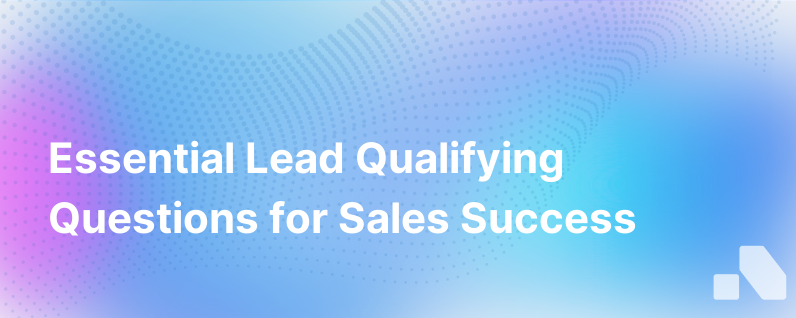
In the fiercely competitive B2B landscape, the ability to effectively qualify leads is more critical than ever. Intuitive sales reps understand that not every inquiry or lead is an opportunity worth chasing. By asking the right qualifying questions early on, they can save considerable time and focus on leads that are more likely to convert into profitable customers.
Understanding the essence of lead qualifying questions is fundamental. These are the insightful interrogatives strategically posed during initial conversations with prospects to discern their needs, interest level, purchasing power, and decision-making capabilities. The answers to these questions help sales professionals determine whether prospects are a good fit for their offerings and if they deserve to be moved further along the sales funnel.
Let’s explore how to build a powerful arsenal of lead qualifying questions—diving into which questions to ask, why they matter, and how to use the responses to gauge the potency of leads.
The Significance of Lead Qualifying Questions
Qualifying leads effectively conserves valuable resources such as time, money, and effort by ensuring that your sales team’s energies are invested in leads that have the potential to yield results. Not all leads are created equal—some will naturally have more potential and relevance to your business than others. Determining this early on prevents overextending your sales cycle and enhances your overall customer acquisition strategy.
Qualifying also results in a more personalized sales approach. When you understand a lead’s needs and place in the buying cycle, you can tailor your pitch and build a more meaningful connection, increasing the likelihood of a sale.
Crafting Qualifying Questions: BANT and Beyond
For decades, the BANT framework—Budget, Authority, Need, and Timing—has been a staple in sales qualification. However, modern sales narratives have expanded this to include more nuanced questions that foster deeper insights into a prospect’s business pain points and needs.
Here is a comprehensive set of questions that cover various aspects of lead qualification:
1. Budget Questions:
- Do you have a budget allocated for this type of solution?
- What is your budget range for this purchase?
- Can you walk me through the budget approval process at your organization?
- By when do you need to allocate your budget or make a purchase?
2. Authority Questions:
- Who will be involved in the decision-making process for this purchase?
- What is your role in the decision-making process?
- How do you typically evaluate and select vendors?
3. Needs Questions:
- What specific challenges are you hoping to solve with our solution?
- How does this challenge impact your business?
- Have you tried to solve this issue in the past?
- What features or outcomes are most important to you in a solution?
4. Timing Questions:
- What is your timeline for implementing a solution?
- Are there any deadlines driving this project or purchase?
- What factors could affect your timeline?
5. Expansion Questions:
- What future needs do you anticipate as your company grows?
- How does a solution fit into your long-term strategic goals?
6. Solution Fit Questions:
- How does our solution align with your current infrastructure or processes?
- Have you considered similar solutions?
- What are your evaluation criteria for this purchase?
7. Consequence Questions:
- What happens if you don’t implement a solution?
- What do you stand to gain by solving this problem now?
The answers to these questions should guide how you prioritize and pursue each lead, utilizing a scoring system or a CRM to manage and sort leads based on their responses.
The Usage of Qualifying Questions
Conducting a successful qualifying process is an art in itself. The context and the manner in which questions are asked play a crucial role. Here are some guidelines to keep in mind:
- Build Rapport First: Ease into your line of questioning by first building a connection with the prospect. Abruptly bombarding a lead with qualifying questions can feel impersonal or intrusive.
- Listen Actively: Pay attention to the prospect’s answers and formulate follow-up questions that demonstrate that you are listening and interested in their unique challenges.
- Be Flexible: Don’t stick rigidly to a script. The responses you receive might warrant deviating from your planned questions to uncover deeper insights.
- Ensure Reciprocity: Qualification should be two-way. While you assess the lead’s fit, they are also evaluating your business. Be prepared to provide value and answers to their questions as well.
Streamlining Qualification with Technology
In today's digital age, AI-powered tools like Aomni are revolutionizing the lead qualification process. Such platforms can automate the collection of preliminary data, score leads based on predetermined criteria, and even provide real-time insights that help tailor the lead qualification discussion.
Imagine having access to deep account insights, competitive intelligence, and personalized sales content in just 15 minutes before a conversation. Such capabilities greatly enhance the effectiveness of lead qualification by equipping sales professionals with the right information at the right time.
Conclusion
Effectively qualifying leads is a fundamental component of a successful sales strategy. It ensures that your team focuses its efforts on prospects that are most likely to become customers, ultimately leading to a more efficient sales process and higher conversion rates.
With the right questions, a mindful approach, and leveraging cutting-edge AI technology, qualifying leads becomes not just a tactical step, but a strategic endeavor that leads to a robust sales pipeline, tailored engagements, and better business results.